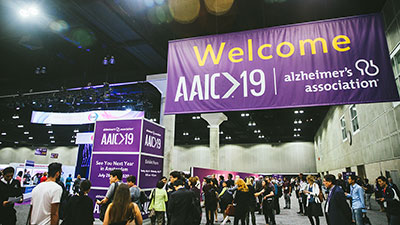
Double Your Impact for the Holidays
Double Your Impact for the Holidays
Your urgently needed year-end gift can go twice as far to provide care and support and accelerate Alzheimer's research this holiday season — and all year long. Show your giving spirit today during this 2x Match Challenge.
Donate NowIn this series, Alzheimer’s Association Chief Science Officer, Dr. Maria Carrillo, outlines why the research community is more optimistic than ever about progress in the Alzheimer's and dementia field.
Part 1: Diversity of Therapeutic Targets in Alzheimer’s Research
The Urgency is Clear
Even knowing the dramatic numbers — more than 5 million Americans living with Alzheimer’s disease, a projected rise to nearly 14 million by 2050, and the astronomical annual costs to the nation of $290 billion — I'm more optimistic than ever.
Path to Progress
Recently, negative results have been reported for later-stage clinical trials, and you may have seen news headlines suggest a slowing down of drug development for Alzheimer’s and related dementias. However, public and private research funding is at unprecedented levels. This allows more scientists to enter the field with fresh ideas, and enables more diverse and innovative avenues to be explored. Currently, there are at least 132 compounds in clinical trials, a number that continues to grow year over year.
The Alzheimer’s and dementia field and its funders have moved beyond the laser-like focus on amyloid to examine the roles of tau protein, prions and protein seeding, inflammation, microbial factors, the gut microbiome, hormonal factors, neuroprotection and regenerative medicine, electrical and magnetic stimulation, sex-specific biology and genetics, combination therapies and precision medicine approaches.
 I am optimistic because I see an abundance of new ideas and fresh perspectives in the research community. This year, we received a record number of submissions of scientific studies at the 2019 Alzheimer’s Association International Conference (AAIC), where researchers gather to share learnings and knowledge. And, we had more attendees than ever before, exploring a variety of topics and biological mechanisms that contribute to Alzheimer’s disease and other dementias. With the steady increases in funding, scientists are better able to explore the complicated circuitry of the brain and the elaborate pathways that may contribute to dementia. By targeting and interrupting these pathways, we may be able to slow or stop the disease, and resulting dementia.
I am optimistic because I see an abundance of new ideas and fresh perspectives in the research community. This year, we received a record number of submissions of scientific studies at the 2019 Alzheimer’s Association International Conference (AAIC), where researchers gather to share learnings and knowledge. And, we had more attendees than ever before, exploring a variety of topics and biological mechanisms that contribute to Alzheimer’s disease and other dementias. With the steady increases in funding, scientists are better able to explore the complicated circuitry of the brain and the elaborate pathways that may contribute to dementia. By targeting and interrupting these pathways, we may be able to slow or stop the disease, and resulting dementia.We are on the verge of something truly transformational. The first survivor of Alzheimer's disease is out there. It's not a matter of if we will find an answer; it's a matter of when. I have hope, more than ever before, that day will be soon.
